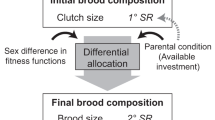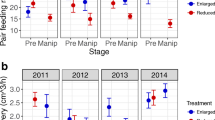Summary
Investment theory states that animals should base their parental investment decisions on expected benefits, and not on whether or not past investment will be wasted. Otherwise, they would comnit the Concorde fallacy. If reproduction has a cost, however, then past investment and expected benefits are necessarily confounded. Assuming a cost of reproduction, animals will be selected to maximize their remaining lifetime reproductive success, subject to a tradeoff between present and future reproduction (Williams' principle). We extend Williams' principle and develop an experimental design that would allow past investment and expected benefits to be varied independently. This design illustrates the importance of the value of the brood relative to the value of future reproduction.
Similar content being viewed by others
References
Biebach H (1981) Energetic costs of incubation on different clutch sizes in starlings (Sturnus vulgaris). Ardea 69: 141–142
Boucher DH (1977) On wasting parental investment. Am Nat 111:786–788
Dawkins R (1976) The selfish gene. Oxford University Press, New York Oxford
Dawkins R, Brockmann HJ (1980) Do digger wasps commit the Concorde fallacy? Anim Behav 28:892–896
Dawkins R, Carlisle TR (1976) Parental investment, mate desertion and a fallacy. Nature 262:131–133
Fagerstrom T (1982) Maternal investment, female rivalry, and a fallacy. Oikos 39:116–118
Keenleyside MHA (1983) Mate desertion in relation to adult sex ratio in the biparental cichlid fish Herotilapia multispinosa. Anim Behav 31:683–688
Maynard Smith J (1977) Parental investment: a prospective analysis. Anim Behav 25:1–9
Neukirch A (1982) Dependence of the life span of the honeybee (Apis mellifica) upon flight performance and energy consumption. J Comp Physiol 146:35–40
Perrins CM (1979) British tist. Collins, London
Trivers RL (1972) Parental investment and sexual selection. In: Campbell B (ed) Sexual selection and the descent of man 1871–1971. Aldine, Chicago, pp 136–179
Weatherhead PJ (1979) Do savannah sparrows commit the Concorde fallacy? Behav Ecol Sociobiol 5:373–381
Weatherhead PJ (1982) Risk taking by redwinged blackbirds and the Concorde fallacy. Z Tierpsychol 60:199–208
Williams GC (1966) Natural selection, costs of reproduction and a refinement of Lack's principle. Am Nat 100:687–690
Author information
Authors and Affiliations
Rights and permissions
About this article
Cite this article
Sargent, R.C., Gross, M.R. Parental investment decision rules and the Concorde fallacy. Behav Ecol Sociobiol 17, 43–45 (1985). https://doi.org/10.1007/BF00299427
Received:
Accepted:
Issue Date:
DOI: https://doi.org/10.1007/BF00299427




